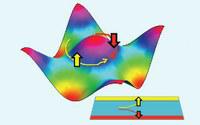“If you think about electronics as we use it now, what we are doing is running patterns of electrical currents through a circuit and trying to get it to process information and do computation,” CIFAR Fellow Arun Paramekanti (University of Toronto) says. “The question is, can one instead harness and manipulate the spin of the electron to do computation?”
In a new paper published in Nature Communications , Paramekanti (University of Toronto) together with lead author Xiaopeng Li and colleagues (University of Maryland), have shown theoretically that interactions between particles spontaneously lead to a state which permits an electrical manipulation of the spin in certain devices.
“We were not looking for this. We were just trying to understand the basic, fundamental physics of these interacting systems and we kind of stumbled upon this effect by chance,” says Paramekanti, a fellow of the program in Quantum Materials .
The researchers studied a theoretical model of ultra-cold gases. “These are just big, fat quantum atoms, which mimic the behaviour of electrons in a solid,” he says.
These atoms can be in one of two states, referred to as spin-up or spin-down. Interactions between the atoms can cause them to spontaneously form a certain type of magnetic order, and their flow patterns then bend differently in an external electric field.
The researchers found that in this state, pushing the atoms along one direction causes them to deflect to opposite edges — spin-up atoms on one side and spin-down on the other — even in the absence of spin-orbit coupling which is usually crucial for this effect. This segregation, called the spin Hall effect, is valuable to physicists because it allows an electrical manipulation of the electronic spin for computation.
“This should set the stage for identifying solid-state materials where this effect can actually become important and lead to useful applications,” Paramekanti says.
He says the next step is searching for some of those materials and testing their model experimentally.
– Lindsay Jolivet
Link
:
http://knowledgecircle.cifar.ca/spintronics-discovery-could-lead-to-better-electronic-devices/

